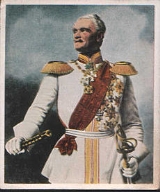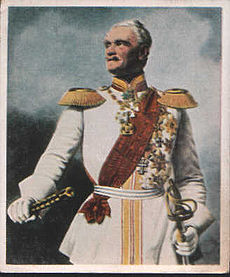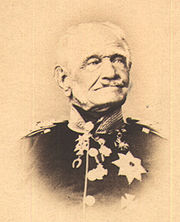
Friedrich Graf von Wrangel
Encyclopedia


Generalfeldmarschall
Field Marshal or Generalfeldmarschall in German, was a rank in the armies of several German states and the Holy Roman Empire; in the Austrian Empire, the rank Feldmarschall was used...
of the Prussian Army
Prussian Army
The Royal Prussian Army was the army of the Kingdom of Prussia. It was vital to the development of Brandenburg-Prussia as a European power.The Prussian Army had its roots in the meager mercenary forces of Brandenburg during the Thirty Years' War...
. He was nicknamed Papa Wrangel.
Wrangel was born in Stettin
Szczecin
Szczecin , is the capital city of the West Pomeranian Voivodeship in Poland. It is the country's seventh-largest city and the largest seaport in Poland on the Baltic Sea. As of June 2009 the population was 406,427....
(now Szczecin, Poland) in Pomerania
Province of Pomerania (1653–1815)
The Province of Pomerania was a province of Brandenburg-Prussia, the later Kingdom of Prussia. After the Thirty Years' War, the province consisted of Farther Pomerania. Subsequently, the Lauenburg and Bütow Land, Draheim, and Swedish Pomerania south of the Peene river were joined into the province...
. He entered a dragoon
Dragoon
The word dragoon originally meant mounted infantry, who were trained in horse riding as well as infantry fighting skills. However, usage altered over time and during the 18th century, dragoons evolved into conventional light cavalry units and personnel...
regiment in 1796 and became second lieutenant in 1798. He fought as a subaltern during the Napoleonic Wars
Napoleonic Wars
The Napoleonic Wars were a series of wars declared against Napoleon's French Empire by opposing coalitions that ran from 1803 to 1815. As a continuation of the wars sparked by the French Revolution of 1789, they revolutionised European armies and played out on an unprecedented scale, mainly due to...
, especially distinguishing himself at Heilsberg
Heilsberg
Heilsberg:* German name of Lidzbark Warmiński* Battle of Heilsberg* Transmitter Heilsberg- See also :* Lidzbark* Lidzbark * Lidzbarski...
in 1807, and receiving the order pour le mérite
Pour le Mérite
The Pour le Mérite, known informally as the Blue Max , was the Kingdom of Prussia's highest military order for German soldiers until the end of World War I....
. In the reorganization of the army, Wrangel became successively first lieutenant and captain, and won distinction and promotion to lieutenant-colonel in the War of Liberation
War of the Sixth Coalition
In the War of the Sixth Coalition , a coalition of Austria, Prussia, Russia, the United Kingdom, Portugal, Sweden, Spain and a number of German States finally defeated France and drove Napoleon Bonaparte into exile on Elba. After Napoleon's disastrous invasion of Russia, the continental powers...
in 1813, won the Iron Cross
Iron Cross
The Iron Cross is a cross symbol typically in black with a white or silver outline that originated after 1219 when the Kingdom of Jerusalem granted the Teutonic Order the right to combine the Teutonic Black Cross placed above a silver Cross of Jerusalem....
at Wachau
Wachau
The Wachau is an Austrian valley with a picturesque landscape formed by the Danube river. It is one of the most prominent tourist destinations of Lower Austria, located midway between the towns of Melk and Krems that also attracts "connoisseurs and epicureans". It is in length and was already...
near Leipzig
Leipzig
Leipzig Leipzig has always been a trade city, situated during the time of the Holy Roman Empire at the intersection of the Via Regia and Via Imperii, two important trade routes. At one time, Leipzig was one of the major European centres of learning and culture in fields such as music and publishing...
, and became colonel in 1815.
Wrangel commanded a cavalry
Cavalry
Cavalry or horsemen were soldiers or warriors who fought mounted on horseback. Cavalry were historically the third oldest and the most mobile of the combat arms...
brigade in 1821, and two years later was promoted major-general. He commanded the 13th Division, with headquarters at Münster
Münster
Münster is an independent city in North Rhine-Westphalia, Germany. It is located in the northern part of the state and is considered to be the cultural centre of the Westphalia region. It is also capital of the local government region Münsterland...
in Westphalia
Westphalia
Westphalia is a region in Germany, centred on the cities of Arnsberg, Bielefeld, Dortmund, Minden and Münster.Westphalia is roughly the region between the rivers Rhine and Weser, located north and south of the Ruhr River. No exact definition of borders can be given, because the name "Westphalia"...
, in 1834, when riots occurred owing to differences between the Archbishop of Cologne and the crown, and the determination and resolution with which he treated the clerical party prevented serious trouble. He was promoted to Lieutenant-General, received many honours from the court, enjoyed the confidence of the Junker
Junker
A Junker was a member of the landed nobility of Prussia and eastern Germany. These families were mostly part of the German Uradel and carried on the colonization and Christianization of the northeastern European territories during the medieval Ostsiedlung. The abbreviation of Junker is Jkr...
party, and commanded successively at Königsberg
Königsberg
Königsberg was the capital of East Prussia from the Late Middle Ages until 1945 as well as the northernmost and easternmost German city with 286,666 inhabitants . Due to the multicultural society in and around the city, there are several local names for it...
and Stettin.
In 1848 Wrangel commanded the II Corps of the army of the German Confederation
German Confederation
The German Confederation was the loose association of Central European states created by the Congress of Vienna in 1815 to coordinate the economies of separate German-speaking countries. It acted as a buffer between the powerful states of Austria and Prussia...
in the First Schleswig War, was promoted to General of Cavalry, and won several confrontations. However, the other European powers pressured Prussia to withdraw its forces, and King Frederick William IV
Frederick William IV of Prussia
|align=right|Upon his accession, he toned down the reactionary policies enacted by his father, easing press censorship and promising to enact a constitution at some point, but he refused to enact a popular legislative assembly, preferring to work with the aristocracy through "united committees" of...
accordingly ordered Wrangel to withdraw his troops from the duchies. Wrangel refused, asserting that he was under the command not of the king of Prussia but of the regent of Germany. He proposed that, at the very least, any treaty concluded should be presented for ratification to the Frankfurt Parliament
Frankfurt Parliament
The Frankfurt Assembly was the first freely elected parliament for all of Germany. Session was held from May 18, 1848 to May 31, 1849 in the Paulskirche at Frankfurt am Main...
, dominated by the Liberals - giving Liberals the rather mistaken idea that Wrangel was on their side. However, the Danes rejected this proposal and negotiations were broken off, and after painful hesitation, Prussia signed a convention at Malmö
Malmö
Malmö , in the southernmost province of Scania, is the third most populous city in Sweden, after Stockholm and Gothenburg.Malmö is the seat of Malmö Municipality and the capital of Skåne County...
which yielded to practically all the Danish demands on 26 August 1848.
Wrangel's insubordination was not counted against him, when in the autumn he was summoned to Berlin
Berlin
Berlin is the capital city of Germany and is one of the 16 states of Germany. With a population of 3.45 million people, Berlin is Germany's largest city. It is the second most populous city proper and the seventh most populous urban area in the European Union...
to suppress the riots there during the Revolutions of 1848 in the German states
Revolutions of 1848 in the German states
The Revolutions of 1848 in the German states, also called the March Revolution – part of the Revolutions of 1848 that broke out in many countries of Europe – were a series of loosely coordinated protests and rebellions in the states of the German Confederation, including the Austrian Empire...
. As governor of Berlin and commander-in-chief of Brandenburg
Province of Brandenburg
The Province of Brandenburg was a province of the Kingdom of Prussia and the Free State of Prussia from 1815 to 1946.-History:The first people who are known to have inhabited Brandenburg were the Suevi. They were succeeded by the Slavonians, whom Henry II conquered and converted to Christianity in...
(appointments which he held till his death) he proclaimed a state of siege, and ejected the Liberal president and members of the Chamber. Thus on two occasions in the troubled history of Prussian revival Wrangel's uncompromising sternness achieved its object without bloodshed.
From this time onwards Wrangel was most prominent in connection with the revival of the Prussian cavalry from the neglect and inefficiency into which it had fallen during the years of peace and poverty after 1815. In 1856, having then seen sixty years' service, he was made a field marshal
Field Marshal
Field Marshal is a military rank. Traditionally, it is the highest military rank in an army.-Etymology:The origin of the rank of field marshal dates to the early Middle Ages, originally meaning the keeper of the king's horses , from the time of the early Frankish kings.-Usage and hierarchical...
. At the age of eighty he commanded the Austro-Prussian army in the Second Schleswig War with Denmark
Denmark
Denmark is a Scandinavian country in Northern Europe. The countries of Denmark and Greenland, as well as the Faroe Islands, constitute the Kingdom of Denmark . It is the southernmost of the Nordic countries, southwest of Sweden and south of Norway, and bordered to the south by Germany. Denmark...
in 1864. Wrangel was too old for active work and often issued vague or impracticable orders; he had always desired that the young and brilliant "Red Prince", Prince Frederick Charles of Prussia
Prince Frederick Charles of Prussia
Prince Friedrich Carl Nicolaus of Prussia was the son of Prince Charles of Prussia and his wife Princess Marie of Saxe-Weimar-Eisenach . Prince Frederick Charles was a grandson of King Frederick William III of Prussia and a nephew of Frederick William IV and William I...
, should have the command. However, the prestige of Wrangel's name, and the leadership of Frederick Charles, Helmuth von Moltke the Elder
Helmuth von Moltke the Elder
Helmuth Karl Bernhard Graf von Moltke was a German Field Marshal. The chief of staff of the Prussian Army for thirty years, he is regarded as one of the great strategists of the latter 19th century, and the creator of a new, more modern method of directing armies in the field...
, Eduard Vogel von Falckenstein
Eduard Vogel von Falckenstein
Eduard Ernst Friedrich Hannibal Vogel von Falkenstein was a Prussian General der Infanterie.-Biography:...
, and Ludwig Karl Wilhelm von Gablenz made the campaign an overwhelming success.
After the Battle of Düppel, Wrangel resigned his command, was created a graf
Graf
Graf is a historical German noble title equal in rank to a count or a British earl...
(count), and received other honours. In 1866 "Papa" Wrangel assisted in the Austro-Prussian War
Austro-Prussian War
The Austro-Prussian War was a war fought in 1866 between the German Confederation under the leadership of the Austrian Empire and its German allies on one side and the Kingdom of Prussia with its German allies and Italy on the...
, but without a command on account of his great age. He took a keen interest in the second reorganization of the cavalry arm 1866-1870, and in the Franco-Prussian War
Franco-Prussian War
The Franco-Prussian War or Franco-German War, often referred to in France as the 1870 War was a conflict between the Second French Empire and the Kingdom of Prussia. Prussia was aided by the North German Confederation, of which it was a member, and the South German states of Baden, Württemberg and...
in 1870-71. He died at Berlin in 1877. On the seventieth anniversary of his entering the army, Wrangel's regiment, the 3rd Cuirassiers, was given the title Graf Wrangel.

